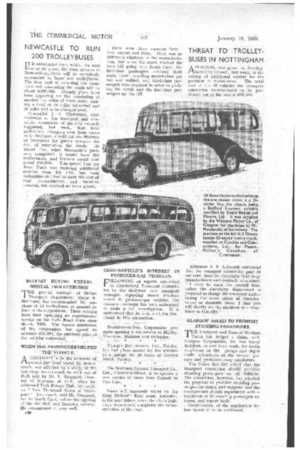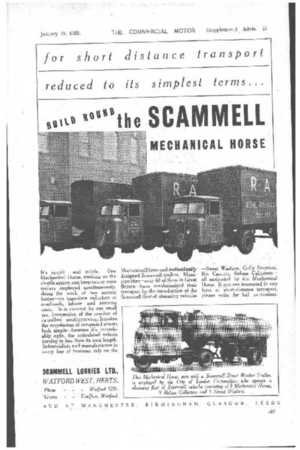THREAT TO -TROLLEYBUSES IN NOTTINGHAM
Page 110

Page 111

If you've noticed an error in this article please click here to report it so we can fix it.
APPROVAL was given by Nottingham City Council, last week, to the raising of additional capital for the
purchase of motorbuses. The total cost of the 16 vehicles the transport committee recommended to be purchased out of the loan is £31,200.
Alderman R. E. Ashworth contended that the transport committee paid 50 per cent. more for electricity than large manufacturers and domestic consumers. " I want to warn the council that, unless the electricity department is prepared to charge the transport undertaking the same prices as manufacturers or domestic users, I fear you will shortly see the abolition of trolleybuses in this city."
GLASGOW ASKED TO PROHIBIT STANDING PASSENGERS.
'THE Transport and General Workers 1 Union has lodged a claim, with Glasgow Corporation, for free travel facilities, to and from work, for inside employees on the garage and depot staffs, attendants at the central garages and permanent-way employees.
The Union has also asked that the transport committee should prohibit standing passengers on all vehicles. The committee, however, has rejected the proposal to prohibit standing passengers on trams, and suggests that the management should experiment with a maximum of 10 standing passengers on trams, and report back.
Consideration of the application for free travel is to be continued.
It's simple — and subtle. One Mechanical Horse, working on the shuttle system, can keep two or more trailers employed simultaneously, doing the work of two normal lorries—an ingenious reduction of overheads, labour and running costs. It is covered by one small tax, irrespective of the number of itstrailers—another saving. It makes the negotiation of congested streets look simple—because it's remarkably agile, the articulated vehicle turning in less than its own length. Industrialists and manufacturers in every line of business rely on the Mechanical Horse and individually designed Scarnmell trailers. Munii cipalities—over 60 of them n Great Britain—have revolutionised their transport by the introduction of the Scammell fleet of cleansing vehicles —Street Washers, Gully Emptiers, Bin Carriers, Refuse Collectors all motivated by the Mechanical Horse. If you are interested in any form of short-distance transport, please write for full particulars.




















































































































































